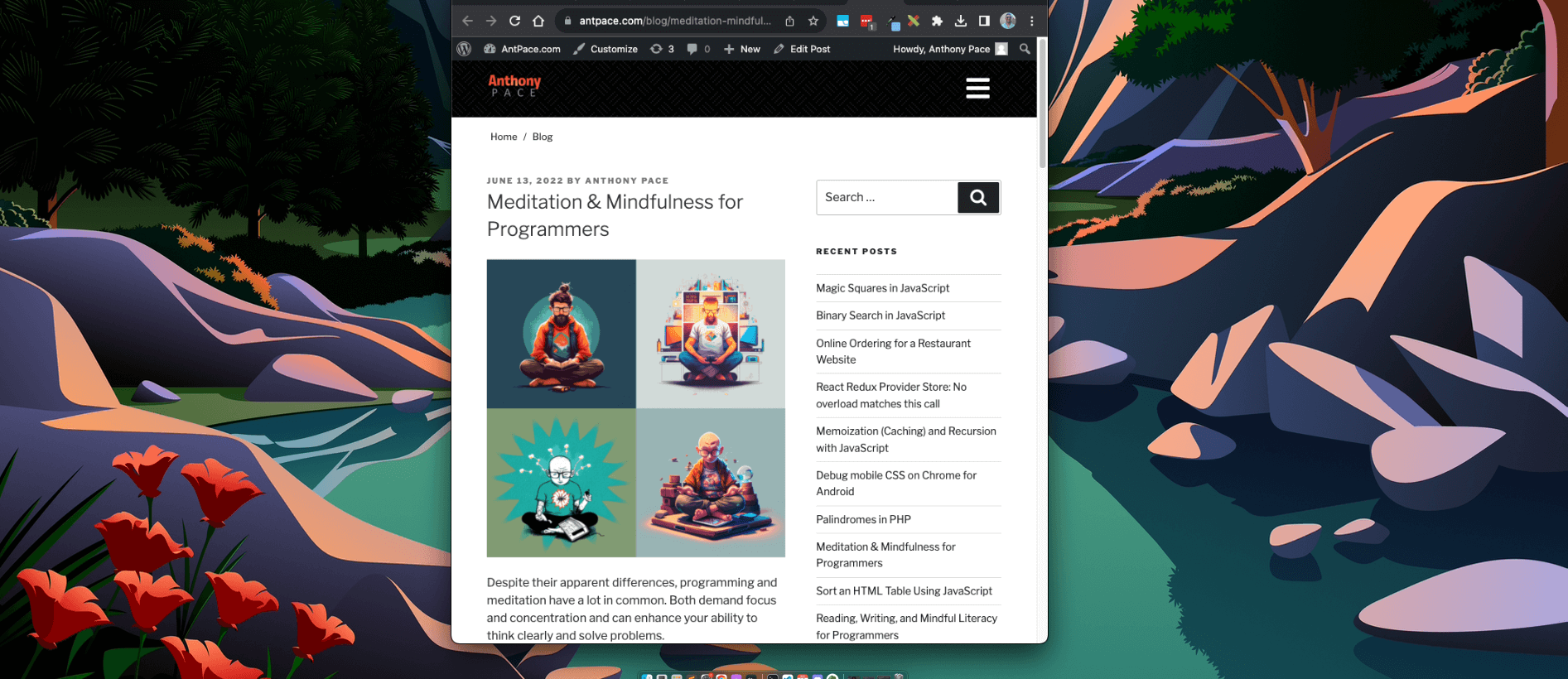Programming and meditation have a lot in common. Both demand focus and concentration and can enhance your ability to think clearly and solve problems.
When you program, you are constantly thinking critically and solving problems. You must be able to debug your code when something goes wrong, pay close attention to the little things, and think rationally. This can be mentally difficult since it calls for intense focus and concentration.
Focus and concentration can be enhanced through the practice of meditation. It can entail sitting in quiet while concentrating on your breath or a mantra, which is a particular word or phrase. This can assist with distraction removal and strengthen your capacity for sustained attention.
I started meditating early in my career as a programmer. Having had an interest in Buddhism, the tangental practice of meditation was appealing as a self-care ritual. I didn’t anticipate the impact its benefits would have on my skill, motivation, and focus. These necessary attributes compounded as my practice grew.
Meditation can help reduce stress and anxiety. This is important for programmers, as the work can be challenging. The ability to stay calm and focused in the face of stress can be invaluable in the programming world.
I had always been a workhorse, spending hours upon hours coding and debugging. Meditating for just a few minutes a day helped me to clear my mind and focus on the task at hand. I discovered I could sleep better and was less irritable.
As I continued to meditate, I found that my productivity increased, and I was able to tackle problems that previously seemed insurmountable with ease. My coding was more precise and effective. I was able to think more imaginatively and provide fresh ideas for problems.
I was so impressed with the benefits of meditation that I began to teach it to my colleagues. They also discovered that it made people more productive and happier at work.
Writing as a Meditation Practice
In another post, Reading Habits for Programmers, I discuss the benefits of practicing focus to improve coding skills. I mention that “if reading benefits your coding ability, then meditation does too”. I would go as far as to say that reading is a form of meditation. Any time we intentionally shift our focus from scattered to laser-like, we are practicing mindfulness. Note-taking and blogging is a great way to do that too.
Writing about how the world seems through your own particular lens fosters mindfulness and appreciation. It keeps your mind grounded in this realm. Journaling is an important ritual that I practice daily, but it is hard to take note of and digest everything that happens in our lives. Doing it here is a way that I can highlight the stuff that has truly touched me.
To get philosophical about it, I think that what’s really out there and what we experience might be very different things. Like how a the experience of a computer screen showing a beautifully drawn graphical user interface never hints at the reality of computer boards directing electrical circuits to represent the information we see. Our notion of reality is a digital simulation instigated by the sensory input interpreted through our senses.
Walking meditation (kinhin) is another form that has helped get my through challenging times. Solutions, both to engineering problems as well as life obstacles, reveal themselves mid-stride. Stress relief can be induced by physical activity. Fresh air and blood flow are good for the brain. Light exercise is the necessary distraction that gives our mind space to breathe.
Mindfulness
Our senses keep us plugged into reality. They instantly create a connection to the present. Paying attention is the only way to experience this moment in life. If you’re feeling distracted, panicked, or out-of-touch with reality, try taking time to intentionally notice the things that stimulate you.
Setting out a short period of time each day to sit quietly and concentrate on your breathing might serve as a simple way to include meditation & mindfulness into your regular schedule. There are numerous styles of meditation, so it’s worthwhile to try out different techniques to determine which ones suit you.
Though they may appear unrelated, programming and meditation have more in common than you may imagine. Making meditation & mindfulness a daily habit can help you focus better, manage stress and anxiety, and become a better programmer.
Even under the richest of experiential excitement, without mindfulness there is no participation with, nor illusion of, reality. If you mindlessly read a book, you might as well have not read it. If you day-dream during a movie, you may know as much about the plot as someone who has never saw it. The same is true for life in its entirety. Don’t miss out – pay attention.
You can train yourself to get better at paying attention. The better you get at it, the more you will experience the richness of vibrancy of this world. The two best techniques I have found for this is: meditation and reading.
